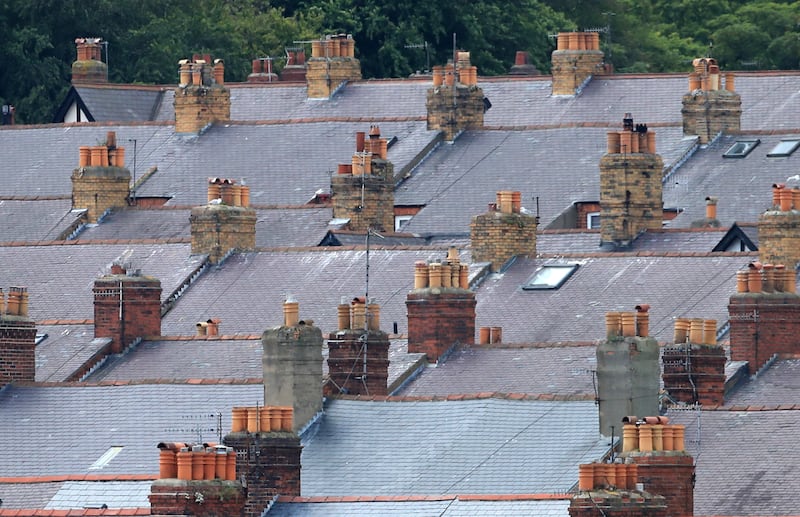Uptake of clean heat pumps to replace boilers has been less than half the expected levels under a flagship programme, a report has warned.
The Government needs to engage “every household” in the shift to clean heating, the National Audit Office (NAO) said, as it warned that low uptake of heat pumps was slowing progress on cutting emissions from homes.
It added that ministers should consider spelling out sooner what role hydrogen could play in driving the move away from fossil fuel heating.
Efforts to encourage people to install heat pumps have been slow because costs have remained high and public awareness is low, a report from the independent public spending watchdog said.
Uncertainty around how significant a role hydrogen could play in home heating is hampering investment and effective planning, the report said.

Heat pumps, a renewable technology which uses electricity to draw heat from the ground, air or water for heating buildings, are a key element of the bid to make homes greener.
The Government has ambitions for the installation of 600,000 heat pumps a year by 2028, a rise from 55,000 in 2022, and up to 1.6 million a year by 2035.
Ministers have said they would make a decision in 2026 on the role that hydrogen – which could potentially be put through pipes instead of gas – could play in shifting millions of homes from gas boilers.
Tackling pollution from home heating is one of the biggest decarbonisation challenges, with climate advisers estimating a price tag of £162 billion investment between 2020 and 2050.
But it is key to meeting the UK’s “net zero” – producing zero emissions overall – target by 2050, as heating homes accounted for 18% of the country’s greenhouse gases in 2021.
The report warned that the Department for Energy Security and Net Zero (DESNZ) said assumptions about levels of consumer uptake of heat pumps were “optimistic”, and it has achieved lower than expected uptake of heat pumps through its flagship “boiler upgrade scheme” grant.
Just 18,900 of the clean heating units were installed under the grant scheme from May 2022 to December 2023, less than half the up to 50,000 expected by that point.
Since the grant to help households install heat pumps was increased from £5,000 to £7,500 in September, the number being installed has risen, with uptake nearly 40% higher in January this year compared to a year ago.
But the NAO warned more data was needed to see if the uplift was sustained, and warned there were two major stumbling blocks to increased installation.
The first is cost, with the price of heat pumps reducing by 6% since 2021 against an expectation by the Government it would fall 25% by 2025 – and they are still four times more expensive than a gas boiler, the report said.
Although heat pumps are significantly more efficient than boilers, electricity prices are much higher than gas, and the Government is around two years behind on its pledge to rebalance the energy costs – for example by moving green and energy efficiency levies from electricity to gas, the NAO said.
The second problem is low consumer awareness, with research showing that around 30% of people have never heard or knew hardly anything about the need to change the way homes are heated to reach net zero.
Meanwhile, trials on hydrogen have been delayed or abandoned in the face of local opposition, and while saying it would make a decision on the technology in 2026, since then the Government has indicated it will only play a small role in the switch from fossil fuel heating, adding to uncertainty.
Ministers should consider whether it is possible to make decisions on the role of hydrogen before 2026, and they need to bring in an overarching long-term consumer engagement plan to deliver on clean heating goals, the NAO said.
While some have advocated a street-by-street approach to switching people over to heat pumps, the NAO said such a model would require “careful planning and public engagement” and should be kept under review.
The Government also needs to consider the cost implications of a reduced role for gas networks as more people switch to alternatives, speed up work to rebalance the costs of electricity and gas, and report annually to Parliament on its progress in installing heat pumps, the public spending watchdog said.
Gareth Davies, head of the NAO said: “Government needs to engage every household to achieve its objective to decarbonise home heating as part of the transition to net zero.
“DESNZ’s progress in making households aware and encouraging them to switch to low-carbon alternatives has been slower than expected.”
Responding to the report, Meg Hillier, chairwoman of the Parliamentary Public Accounts Committee, said: “DESNZ need to be realistic about levels of consumer demand, raise public awareness of heat pumps and work with industry to make heat pumps more affordable for households.”
A DESNZ spokesperson said: “By helping rather than forcing families to install heat pumps, with a 50% bigger heat pump grant, we have boosted applications by nearly 40%.
“Our Welcome Home to Energy Efficiency campaign is running on TV, radio and newspapers, reaching 16.6 million households with advice and information about how heat pumps, insulation and solar panels can cut their emissions and energy bills.”








